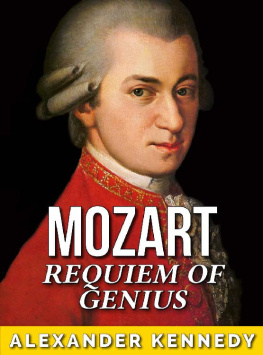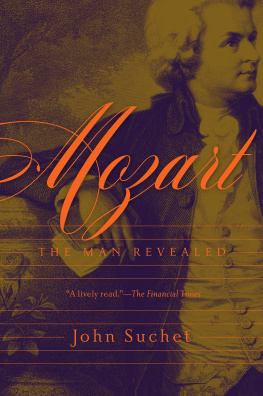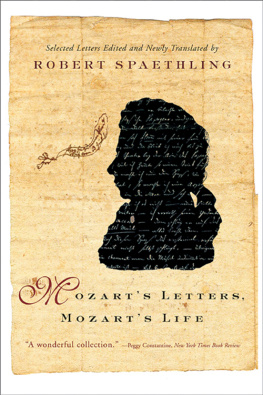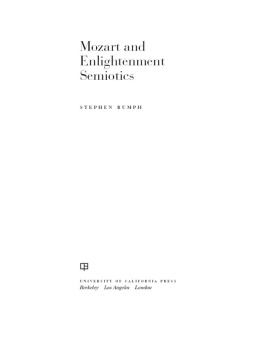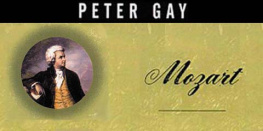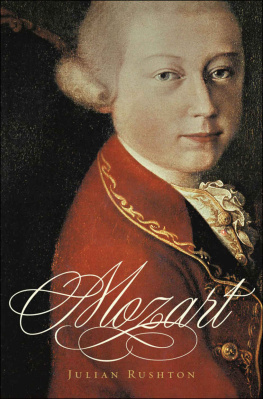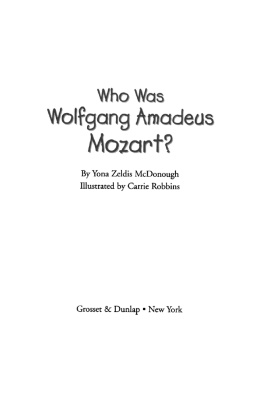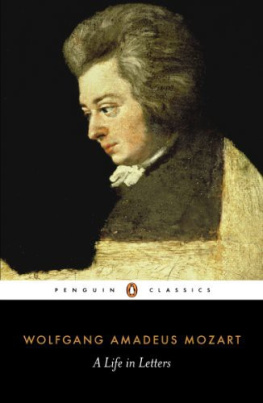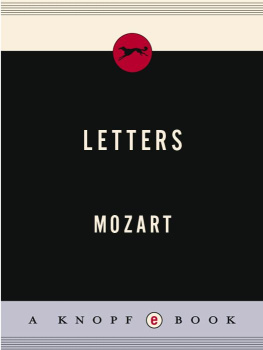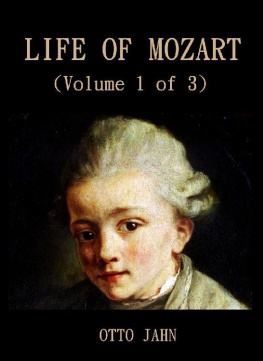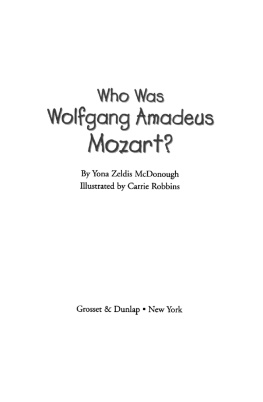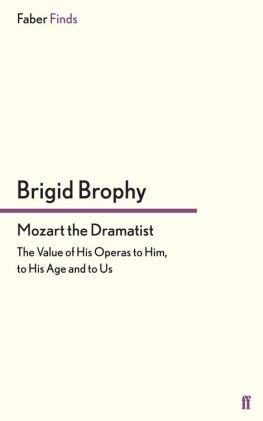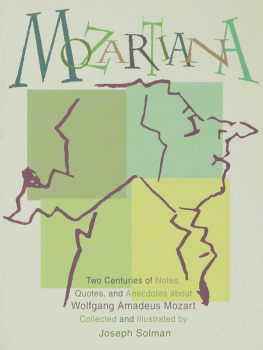Copyright 2017 Fritzen Publishing LLC. All Rights Reserved.
Alexander Kennedy is an imprint owned by Fritzen Publishing LLC.
No part of this book may be reproduced or transmitted in any form or by any means, electronic or mechanical, including photocopying, recording or by any information storage and retrieval system, without written permission from the publisher.
The information provided within this book is for general informational purposes only. While we try to keep the information up-to-date and correct, there are no representations or warranties, express or implied, about the completeness, accuracy, reliability, suitability or availability with respect to the information, products, services, or related graphics contained in this book for any purpose.
Have a question or concern? Let us know.
Prologue
When Mozart and his librettistthe lyricist for an operabegan work on The Marriage of Figaro in 1786, they knew it was potentially explosive, even revolutionary, material.
The French playwright and polymath Pierre Beaumarchais, who had written their source material, had become one of Europes best known authors, but this had as much to do with controversy and scandal as his undeniable talent. Beaumarchais father had been a watchmaker of Frances struggling Protestant minority, but his son had managed to rise into the lower nobility with the success of his play The Barber of Seville (adapted after Mozarts lifetime into Giaochino Rossinis famous opera). But it was The Marriage of Figaro that made Beaumarchais name on the world stageand caused a good deal of political trouble.
The play thoroughly satirized the nobility, finishing with a thorough defense of liberty and denunciation of inherited rank by its lower-class hero, Figaro. Marie Antoinette is said to have enjoyed it, but King Louis XVI stormed out from a private reading of the script, ironically declaring that the Bastille would have to be destroyed if the performance of the play is not to have dangerous consequences. When aristocratic and wifely pressure finally persuaded the king to allow the play to be staged, it was a smash hit. Figaros fifth act rant in particular always received an ovation, and so many people packed the theater that there were occasional fatalities from people being crushed to death.
In the long run, Louis was exactly right, of course. Georges Danton, a famous revolutionary, declared that The Marriage of Figaro had killed the nobility in France, and Napoleon Bonaparte later voiced a similar sentiment. The French Revolution was still a few years in the future when Mozart was writingin fact, Marie Antoinette outlived the composer by several years. But Mozart was reliant on Marie Antoinettes brother, the Holy Roman Emperor Joseph II, for patronage, and Joseph was determined not to repeat his sisters mistakes.
Knowledge of Mozarts political views is sketchy and speculative, but it is at least clear that he was no Beethoven, passionately dedicating his third symphony, Sinfonia Eroica , to the self-made Napoleon, and then just as passionately tearing up that dedication when he felt Napoleon had betrayed democratic ideals. Mozart appears to have been interested in Figaro simply because it was funny and successful, and he thought an operatic adaptation of it could make him a good deal of money. Opera composers were paid with flat fees, and published scores were almost nonexistent, but a major public success would at least win him future contracts and patronage.
To make it more acceptable to his patrons, Mozarts librettist, Da Ponte, scrubbed the text of its political implications wherever he could. Da Ponte was a somewhat revolutionary character himself, a man who later generations recognized as a Bohemian artist. He was born a Jew, converted to Catholicism, and even joined the priesthood for the free education it provided. But he was not a religious man at heart, and indeed was a companion to the famous lover Casanova on many of the latters escapades. Banished from Venice for fifteen years for his omnivorous sexual tastes, Da Ponte began writing librettos in Vienna for such popular composers as Antonio Salierithen considered the superior talent to Mozart.
At its heart, The Marriage of Figaro remained the story of an intelligent man of the lower classes winning a victory over a foolish noblethere was nothing Da Ponte could or would do about that. However, he took out the sharpest of Beaumarchais critiques. Figaros famous rant against inherited privilege became, instead, a long aria railing against the faithlessness of women. The censors approved the revised version without much objection; Joseph II is said to have approved it personally.
Mozarts opera was therefore not revolutionary for its politics. Instead, it was revolutionary for its music.
Biographer Paul Johnson observes that Mozart appears to have worked harder on Figaro than on any other piece in his life, but given Mozarts ability to compose at terrific speed, this simply means that the composer worked on the opera for six weeks instead of two or three. The result was magical. At last, Mozart had a project on which he could bring all of his musical gifts to bear: his genius for melody, his startling ability to convert emotion into sound, and his rich knowledge of the strengths and limitations of each of the orchestras instruments (Mozart could play them all, it was said, save for the harp). Yet perhaps because of Mozarts ability to compose so quickly, the effect is one of unity, despite the multiplicity of voices and styles that make up the whole.
Figaro remains one of the most beloved operas ever written and a modern staple, known by performers as the opera that cant go wrong. A century after its premiere, Johannes Brahms said every number in Mozarts Figaro is a miracle to me; I find it absolutely incomprehensible how someone can create something so absolutely perfect; nothing like it has ever been done again.
On May 1, 1786, Figaro premiered at the Burgtheater, built forty years before by Joseph and Marie Antoinettes mother, Empress Maria Teresa, as Austrias National Theater. Mozart conducted the orchestra while playing the keyboard. At first, it seemed that he had a hit on his hands. The audience demanded so many encores that Emperor Joseph II issued rules banning excessive applause at the theater so that he could return to the palace in time for bed. This was surely an improvement over his famous complaint about Mozarts previous opera: Too beautiful for our ears, my dear Mozart, and monstrous many notes. Mozart conducted the second performance and then handed over the conductors duties to another in order to return to composing.
But despite this flash of success, Figaro fizzled in the coming weeks. The calls for encores diminished. A rival composers faction paid hooligans to hiss and boo the best numbers from the galleries. A competing opera (also scripted by Da Ponte) with stereotypical characters and straightforward music opened and promptly stole Mozarts crowds. Figaro finally had to close after just nine performances. Perhaps Mozart had included too many notes again after all. He was 450 florins richer, his initial flat fee, but he still hadnt attained the fame he sought. We can only imagine how he must have felt to have the best work of his lifeand surely a man with his ear knew it was his best work, arguably the best he ever wrotedisappear so quickly.
But then came Prague. Figaro was staged there by some of Mozarts friends at the end of the year, and the reaction was all the composer could have wished. He rushed there himself to find a city in the grip of Figaro fever. Men and women were whistling and dancing to its songs in the streets. Mozart wrote that they talk about nothing but Figaro . Nothing is played, sung, or whistled but Figaro . No opera is drawing like Figaro nothing, nothing but Figaro ! He came home from his short visit with a thousand florins in his pocket from new commissions.

